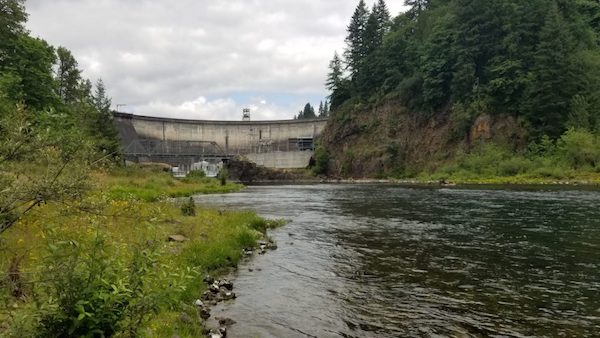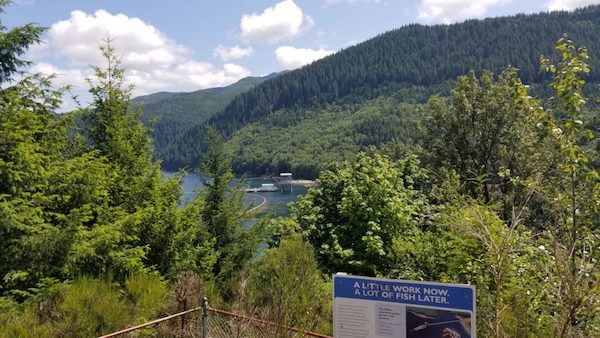
New N. Lewis Fish Passage Plans ‘Cautiously Welcomed’
There are signs PacifiCorp appears ready to add long-promised fish passage facilities on its North Fork Lewis River reservoirs, news that’s being “cautiously welcomed” by state and tribal fishery managers and conservation groups as a potential “significant step toward restoring access to critical salmon habitat” on the system.
According to letters exchanged earlier this month with federal fish overseers, the utility proposes to build upstream fish collectors in Merwin and Yale Reservoirs for adult Chinook, coho, steelhead and bull trout, as well as downstream facilities in both to aid the outmigration of smolts, moves that would effectively reintroduce the species to long-blocked waters.

It’s a sharp turnaround from just a couple years ago when PacifiCorp – a Berkshire Hathaway company – was going to do habitat restoration instead of fish passage on its two lower impoundments, as it had agreed to a decade and a half ago.
The new facilities would be fully in place by mid-2026 on Yale and mid-2028 on Merwin, and PacifiCorp proposes to place 1,085 returning adult coho, 260 adult winter steelhead and 210 adult spring Chinook into Yale and 600 coho and 75 steelhead into Merwin to spawn in feeder tributaries. The Yale smolt collector would be built so the facility could accommodate higher numbers of outmigrants than models suggest would be naturally produced, according to the utility.
“We look forward to working with PacifiCorp on forthcoming efforts to implement fish passage and honor commitments to local communities in a timely manner,” said Kessina Lee, WDFW Region 5 director, in a press release today. “Providing full fish passage past the dams on the Lewis River will significantly contribute to salmon recovery in the Lower Columbia River, and it serves as a beacon of hope and progress for salmon recovery in the Pacific Northwest.”
Currently, PacifiCorp operates an adult trap below Merwin Dam and trucks returning fish to Swift Reservoir, the third and uppermost of the three impoundments on the NFL and where there is also a floating surface collector to capture smolts and bring them down past the middle two lakes.

According to fish advocates, in 2004 the utility agreed to put in fish passage at each dam and in exchange, local tribes and others would not fight relicensing the projects, leading to 2008’s 50-year federal OK to operate the hydropower facilities.
But in 2019 PacifiCorp received a preliminary determination from the Trump Administration’s USFWS and NMFS that it didn’t have to do so in Merwin and Yale in lieu of habitat restoration work elsewhere.
After pushback, however, the two agencies withdrew the determination last summer and on March 8 PacifiCorp proposed the new fish passage strategy.
In response, NMFS’s Barry Thom and USFWS’s Robyn Thorsen expressed general support for building the structures and other elements, and in a follow-up letter the utility says it will notify FERC, which licenses dams, and other parties to the licensing agreement.

The news had fish advocates putting out a press release today headlined “New hope for Lewis River Salmon and Steelhead” in which the Cowlitz Tribe, Yakama Nation, WDFW, American Rivers, Columbia Riverkeeper and Trout Unlimited said they “cautiously welcome PacifiCorp’s new course of action and view it as a critical step to recovering Endangered Species Act-listed fish in the Lewis River, an important tributary to the Lower Columbia River.”
Lewis coho, fall Chinook, winter steelhead and bull trout fall under threatened or endangered listings.
Fish passage advocates did take umbrage at the utility’s delays and vowed to continue working to ensure it.
“It remains clear that generations of salmon and other anadromous fish have died at the base of these structures,” stated Yakama Nation Fish and Wildlife Committee Chair Gerald Lewis. “If PacifiCorp does not follow through and build passage, these native fish resources will die. The Yakama Nation will therefore continue to work with PacifiCorp to ensure promises are kept and fish passage is provided so that our People can continue to conduct commercial, ceremonial, cultural, and subsistence fishing within this tributary.”

